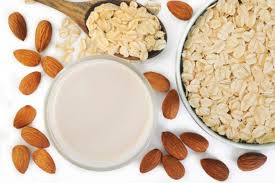
Depending on your dietary needs or ethical beliefs each suits a need. Read up to see which one fits your profile.
Both plant-based milks are healthy alternatives to cow milk. They are high in calcium, vitamin D and vitamin A.
These drinks are fortified because they don’t have these nutrients naturally.
Almond Milk
Almond Milk is ideal for people who are watching their weight and looking out for their blood sugar. It’s lower in calories, fat content and glycemic index.
It’s naturally lactose free, and it’s high content in vitamin E can aid with deficiencies.
Almond milk is NOT recommended for anyone with an almond or tree nut allergy.
Oat Milk
Oat Milk is the choice to go for if your allergic to nuts or want to increase your vitamin B12 intake.
Great for people with Lactose intolerance or nut allergies. It’s naturally dairy, soy and nut free.
Oat Milk is NOT recommended for anyone who has an allergy or intolerance to oats.
And people with celiac disease must be careful with the brand. They much choose the gluten-free option.
To see how both plant milks fared in the last year, we compared their Google searches.
The peak of Oat Milk Google searches coincides the beginning of the year.
A lot of people start considering leading a healthier lifestyle and this also includes the impact on the environment these milks have, which is much less than the dairy industry.
The Ethical Angle
Although almond milk has a smaller carbon footprint when compared to dairy, according to the University of California San Francisco, almond milk impacts the environment in other ways, mainly water and pesticide use.
More than 80% of the world’s almonds are grown in California. According to a New York Times article cited by UCSF it takes about 15 gallons of water to produce 16.
Considering there are more than 2 billion almonds being produced in California, which is famous for being drought-stricken, there is cause for alarm.
Water from the state’s aqueduct system is being diverted to orchards for irrigation. It’s still unknown how this will affect the farm residents who rely on this drinking water.
On the other hand, use of pesticides in the production of commercial almonds contaminates the limited water supply, making it toxic for farming communities.
Also, the USDA Pesticide Data Program found traces of nine different pesticides in commercially produced almonds.
Five of these are toxic to honeybees, which in turn impacts the pollination of different plants and therefore, the ecosystem.
It’s recommended to buy certified organic almond milk or make your own with organic almonds.
Oat Milk has a huge advantage here. Oat milk is a lot more environmentally friendly than almond milk.
But both of them are a better options compared to dairy milk’s environmental impact.
So it’s pretty much up to your needs and beliefs which plant-based milk you choose.


Be the first to comment